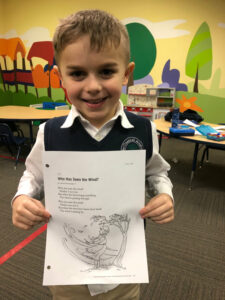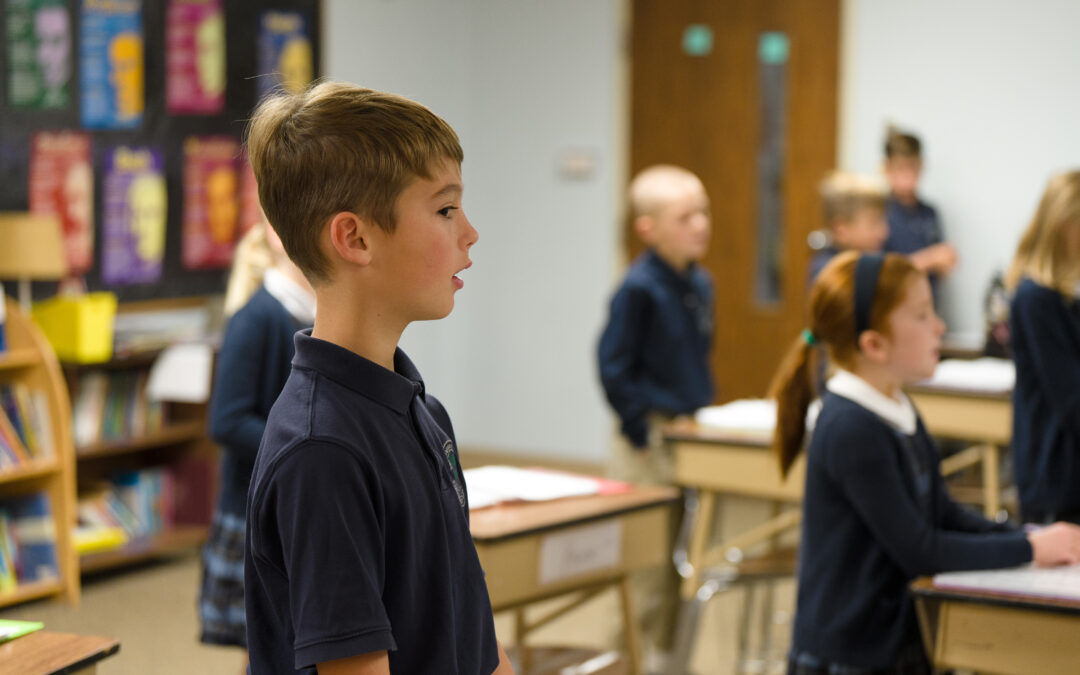Why do we memorize poetry? Why do our students participate in Recite Nights? Isn’t memorization just “kill and drill?” an educational past time that should be drown out by now? Absolutely not!
When you set out to achieve something, the first thing you do is decide where you are going, or what you want to accomplish, then, you work backwards. You have to know where you are going in order to know how to get there.
At The Classical Academy we want to produce graduates who are effective thought leaders, people who can communicate well, and with confidence, using their knowledge, investigation skills, analysis, and evaluation to express themselves logically and persuasively. This doesn’t just happen and it doesn’t come simply through taking one speech class elective in high school. It begins with memorization and starts all the way back in grammar school.
Andrew Pudewa has some of the best remarks on memorization and poetry,
“You can’t get something out of a child’s brain that isn’t there to begin with.” Being a competent writer or speaker doesn’t only rest on learning grammar and practicing more and more writing. Students need a large database in their brain of reliably correct and sophisticated language patterns. Even more important than knowing grammar rules and knowing vocabulary words, is knowing how those words naturally, correctly, even artistically fit together in phrases and clauses. Students who write and speak well are always the ones who possess an extensive repertoire of words, an intuitive understanding of when and how those words can be used in idioms and combinations, and an automatic sense of when they have been used correctly or awkwardly. What enables this type of sophisticated linguistic talent is not a conscious knowledge of “rules,” but the database of language information which has been stored in the brain.
This brings us to the obvious question- where are students growing their database of linguistic patterns? Your typical child’s main source of language is through TV, movies, internet, media, and same age peers. It won’t take long observing our current culture to realize that if media and peers are the main source of linguistic patterns we are in big trouble! Parents, teachers, and other adults are also means of linguistic patterns, but most of our conversing with our children is not exactly on a sophisticated front as we tell them to, “Please put your clothes away.” “Did you get your schoolwork finished?” etc.
This is why we have such strong convictions about reading not just any book, but good books, to our children and students. The quality of books your child reads and hears is essential to their development of language patterns.
But is that all there is to it? Read and hear good quality literature? While reading and hearing sophisticated language patterns in consistent, large quantities helps build a repertoire of sophisticated language, all too often schools and parents neglect the other essential piece- memorization.
Andrew Pudewa continues,
“Memorized (or “by heart”) language was a mainstay of education for almost all of recorded history until about 60 years ago, when misguided educationists began to promulgate the idea that memorization, along with other types of ‘rote’ learning, was harmful to children’s creativity, understanding, and enjoyment of learning. Perhaps one of the most damaging doctrines ever to invade teachers’ colleges, the concept that memorization was at best unnecessary and at worst downright harmful, is now handicapping another generation of students, who, because of the sad state of the popular media, are most in need of the linguistic foundation that memorization provides.
Young children will naturally memorize language patterns from their cultural environment. If teachers and parents don’t provide enough high quality models, kids will automatically internalize and memorize random stuff from their environment- mainly TV advertisements and songs on the radio, most of which we would not find to be “reliably correct and sophisticated.” If we don’t provide the content and opportunity for organized memorization kids will let popular culture be their teacher. If we don’t provide them with Belloc and Rossetti, they’ll memorize McDonald’s commercials and the theme song to their favorite TV show. Memorization is not only natural for young children, it is culturally powerful and educationally essential.
Neurologically, memorization develops the brain in a way nothing else can. Neurons make connections through frequency, intensity, and duration of stimulation. When children memorize (and maintain the ability to recite) interesting poems, all three of these variables are involved in a powerful way, strengthening the network of neural connections which build the foundation of raw intelligence. In short, the more neurons we have connected to other neurons, the more “RAM” we have in the CPU of our brains, and the rigor of memorization of poetry is a powerful tool in this process.”
What are other benefits of memorization?
- Pride and pleasure in recitation– how many of us remember nursery rhymes or poems from our childhood and feel pride and pleasure in still being able to recite them? Have you ever seen your child get really excited to show you what they memorized? Children take great delight in storing and delivering all kinds of information!
- Builds confidence– reciting poetry takes a specific attention to detail. It takes work to memorize and recite precisely. When student accomplish this feat they gain confidence and realize, “I can learn anything!” This carries over into learning math facts, history timelines, phonics and grammar rules, and Latin vocabulary.
- It gets easier- the more you memorize, the easier it gets! Just like muscles, memory is improved from exercise.
Why poetry specifically?
- They are good training grounds for memorization because they are easier to remember than prose.
- Poetry has forms of chosen rhythm and rhyme, which means they require sophisticated words and grammatical patterns above our normal exposure or conversational usage.
- Poetry has richness of meaning and concentrated thought and therefore provides ample opportunity for questions and reflections.
This point alone brings us back to, “You can’t get out what you don’t put in.” When we fill our students hearts and minds with truth, goodness, and beauty, and we give them a rich and full database of linguistic patterns, we suddenly see these language patterns come back out in students speaking and writing. Memorization is the most complete form of internalization, and the best way to intimately know something is to know it so well you can communicate effectively, fluently, and artistically.
So what does this practically look like? Do we actually see the benefits pour back out of our students from memorizing good poetry? We do!
One of the poems our 1st graders have memorized is “Who Has Seen the Wind” by Christina Rossetti. One of our students was working on this poem with his mom. She used the poetry as a teaching opportunity and told her son, “The wind is like the Holy Spirit.”
Then, all on his own, he spontaneously began to say his own poem, modeled after the concept and linguistic pattern of Christina Rossetti’s poem that he had internalized. He wasn’t taught how to do this. He wasn’t asked to write poetry from scratch. It’s a natural outpouring of filling their minds and hearts with truth, goodness and beauty.

Who Has Seen God
By: Reuben
Who has seen God?
Neither I nor you:
But when you believe in Christ
God is passing through you.
Who has seen God?
Neither you nor I:
But when the Holy Spirit comes
God is passing by.
This is a 1st grade version of what it is all about…Educating students in such a way that their education naturally pours out of them. This is what they have to show at the end of the year. We seek education that naturally pours out in hundreds of ways over seeking standardized test scores and a report card.
Take an example from an older student memorizing a portion of “Overcoming Fear” by Dietrich Bonhoeffer.
We name the One who overcame fear and led it captive in the victory procession, who nailed it to the cross and committed it to oblivion; we name the One who is the shout of victory of humankind redeemed from the fear of death—Jesus Christ, the Crucified and Living One. He alone is Lord over fear; it knows him as its master; it gives way to him alone. So look to Christ when you are afraid, think of Christ, keep him before your eyes, call upon Christ and pray to him, believe that he is with you now, helping you . . . Then fear will grow pale and fade away, and you will be free, through your faith in our strong and living Savior, Jesus Christ.
Why is it important that this rich and beautiful prose is permanently resting in his heart and mind? In times of despair, worry, or anxiety, this student will have a feast of words, along with Scripture he has memorized, to draw on, to fill his mind with truth, and to encourage his heart. Not only that, he will have a repertoire of language and concepts on which to draw as he speaks and encourages others in times of difficulty. This doesn’t mean that students start weirdly reciting things from rote memory to themselves or others in times of trial. What it means is that his brain and his heart have internalized the concepts and language patterns and those things begin to pour out. You simply cannot tell what you do not know.
Students at The Classical Academy have the common experience of committing to memory a wide range of sophisticated poetry, prose, Scripture, and great speeches and having the opportunity to present their pieces at Recite Nights throughout the school year. These nights are the exact opposite of dry, boring, drill and kill memorization. You wouldn’t believe the wonderful pieces our students from PreK all the way up recite. It’s one of the best loved programs at the Academy.
Interested in seeing what it’s all about? Contact us to attend our next Recite Night, or come find out more about The Classical Academy university-schedule school at a parent info night.


